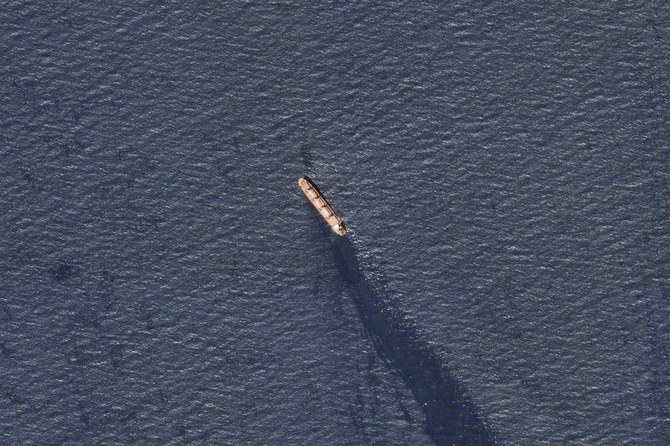Dubai – The Rubymar, a Belize-flagged, British-registered, and Lebanese-operated cargo ship, remains afloat after being attacked by Yemeni rebels in the Gulf of Aden. The vessel, carrying combustible fertilizer, was hit by a missile strike claimed by Iran-backed Houthi rebels on Sunday.
The Blue Fleet Group, the ship’s operator, confirmed that the crew was safely evacuated to Djibouti after one missile caused damage to the ship’s side, allowing water to enter the engine room and causing the stern to sag. A second missile hit the vessel’s deck without causing major damage, according to Blue Fleet CEO Roy Khoury.
Despite claims by the Houthi rebels on Monday that the ship was at risk of sinking, Khoury stated on Thursday that the Rubymar is still afloat. An image captured on Wednesday showed the stern low in the water. The plan is to tow the damaged ship to Djibouti, with the tugboat expected to arrive within the next two to three days.
While there is currently no immediate risk of sinking, Khoury acknowledged the possibility. Ship-tracking site TankerTrackers.com confirmed that the Rubymar had not sunk but warned of fuel oil leakage.
The attack on the Rubymar marks the most significant damage to a commercial ship since the Houthi rebels began targeting vessels in November. The rebels claim these attacks are in solidarity with Palestinians in Gaza during the Israel-Hamas war.
The Djibouti Ports and Free Zones Authority reported that the ship’s last port of call was the United Arab Emirates, with Belarus as its intended destination. The vessel, carrying 21,999 metric tons of fertilizer classified as “very dangerous,” had a crew of 24 members, including individuals from Syria, Egypt, India, and the Philippines.
The Houthi attacks have led some shipping companies to detour around southern Africa to avoid the Red Sea, impacting the normal flow of about 12 percent of global maritime trade. The UN Conference on Trade and Development warned of a more than 40 percent decline in commercial traffic through the Suez Canal over the previous two months due to such disruptions.


